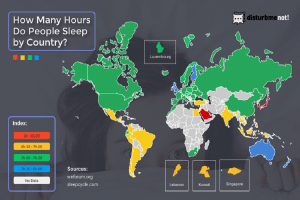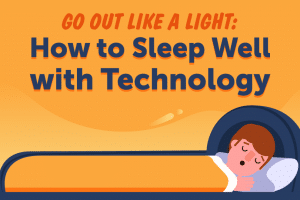Bizarre Sleeping Habits of Famous People (Infographic)
written by / May 20, 2019
Did you know that Napoleon slept only four hours a day or that Leonardo Da Vinci was a polyphasic sleeper? In our infographic, you can find out some pretty amazing facts about famous people from the world of politics, business, sports, science, and art and their strange sleeping habits.
Although we should sleep eight hours every night to stay healthy and be productive, most of these successful people don’t follow this ideal sleep pattern. Some of them were even able to work for days without any rest. Surprisingly, regardless of their questionable sleep habits, they managed to come up with some astonishing inventions that changed our daily lives.
It’s really unexpected that people with such unusual habits have become so successful since we all know that lack of sleep impairs our ability to focus and think clearly. Of course, this doesn’t mean you should sleep less than recommended. A good night’s sleep is vital for your physical and mental wellbeing.
If you think that famous people don’t have sleep problems, you’re terribly wrong. Many of them suffer from sleep disorders, from insomnia to sleep paralysis. But you may find the kinds of home remedies for good sleep they used to deal with them particularly interesting. For example, one famous painter used camphor for treating insomnia, which eventually led to his death.
So would you like to find out which scientist slept 20 hours a day and which slept only 3–4 hours every night? Maybe you’re interested in learning more about Tesla’s sleeping habits? If so, check out the infographic we prepared for you.
Negative Effects of Lack of Sleep
More and more people have sleep-related problems that keep them from getting an adequate amount of sleep, often due to bad sleep habits. It’s shocking that between 50 and 70 million people suffer from a sleep disorder in just the US. The most prevalent sleep disorder is insomnia, which prevents people from falling or staying asleep. Considering these facts, millions of people suffer from sleep deprivation, so they have to struggle to keep up with their daily tasks without proper rest.
It’s a well-known fact that lack of sleep can have numerous adverse effects on our health. It makes us irritable, impatient, and anxious. If you don’t get enough ZZZs during the night, you’ll probably have to deal with daytime sleepiness. Other poor sleep quality symptoms include low concentration and impaired memory. As a result, we’re less productive and prone to making mistakes.
Unfortunately, the list of sleep deprivation effects doesn’t end here. A lack of quality sleep endangers our physical health, too. Besides increasing the risk of developing type 2 diabetes, it can lead to high blood pressure and heart disease. It also weakens our immunity. As you can see, not having a good night’s sleep can wreak havoc on your body.
12 Tips on How to Get the Best Sleep Possible
Do you wake up tired in the morning? Do you regularly get less than the recommended eight hours of sleep? Or do you have trouble falling asleep? If you’ve said “yes” to any of these questions, it’s a good idea to keep on reading and find out how you can change your lifestyle. Getting proper rest night after night can considerably improve your quality of life.
We hope these simple tips—which are often referred to as good sleep hygiene—will help you develop healthy habits that promote quality sleep. We’ll also talk about the sleep patterns and habits of famous people in order to give you both good and bad examples. You’ll see that you’re not alone in your efforts to get a good night’s sleep.
1. Develop a Consistent Sleep Schedule
Our internal clock affects our periods of sleepiness and wakefulness. In order to help your body’s clock, you should always go to bed and get up at the same time. This applies to weekends, too. This way, you’ll more easily fall asleep and maintain asleep during the night. So what is a good sleep schedule? It’s recommended to go to sleep anywhere between 8 p.m. and 12 a.m., and have 7–9 hours of sleep.
- Freud always went to bed at 1 a.m. and woke up at 7 a.m.
- Mozart went to sleep at 1 a.m. and woke up at 6 a.m.
2. Have a Relaxing Bedtime Ritual
Before bedtime, do something that helps you unwind. You might read a book, listen to relaxing music, have a warm bath, or drink a cup of tea—just make sure it’s decaf. Think of anything that helps you forget about daily activities and make it a part of your sleep routine. Preparing your mind for a night’s rest can help you sleep through the night.
- Tallulah Bankhead, a famous actress, hired people to hold her hand before she fell asleep.
- Part of Arianna Huffington’s bedtime routine is having a bath with Epsom salt and lavender oil.
3. Avoid Late Afternoon Naps
If you have problems dropping off, it’s best to avoid daytime naps. Although they can help you increase alertness and boost your mood, they can also rob you of your precious night’s rest. If you absolutely can’t go through the day without a nap, one of the more useful sleeping tips is to make sure it’s short and before 5 p.m.
- Franz Kafka would take a four-hour nap from 3:30 p.m. to 7:30 p.m.
- JFK took a nap for an hour or two after his lunch.
4. Work out Regularly
Working out can greatly improve sleep quality. Although strenuous exercise has the best effect, you should try to do at least some light exercise every day. However, don’t work out close to your bedtime, since physical activity stimulates the production of the stress hormone cortisol, which will keep you up.
- Emily Bronte would walk around her dining room until she fell asleep.
5. Create a Soothing Environment
A comprehensive sleep hygiene checklist must include creating a relaxing environment in your bedroom. The ideal room temperature for sleep is between 60 and 67 degrees, so your bedroom needs to be pleasantly cool. You should also try to eliminate all distracting noises. Depending on how noisy your surroundings are, you can use a “white noise” machine or earplugs. Don’t forget that it’s best to sleep in complete darkness, so you may find blackout curtains very useful.
- W. C. Fields could only sleep with the sound of rain in the background.
- Mariah Carey sleeps with 20 humidifiers around her bed.
- Eminem puts tin foil on his bedroom windows to keep the light out.
6. Buy a Supportive Mattress and Comfy Pillows
Besides breaking your bad sleep habits, you need to get rid of your old, uncomfortable mattress. If you get up with aches and pains every morning, it’s high time to get a new mattress that will keep your spine in a natural position. If you have a sleeping partner, you might consider getting a larger bed, such as king or California king size. Also, it’s vital to have a pillow that supports your neck in all sleeping positions.
- Lady Gaga sleeps inside of the egg that she used for the performance of her hit single “Born This Way.”
- Jessica Simpson says that lying on the floor helps her fall asleep.
7. Regulate Your Circadian Rhythm with Natural Light
To improve a bad sleep schedule, let light into your room in the morning and spend some time in the sunlight during the day. This will help your internal clock regulate your sleep pattern.
8. Avoid Caffeine, Alcohol, and Cigarettes Before Sleep
Since caffeine is a well-known stimulant, don’t consume coffee, tea, chocolate, or anything else that contains caffeine within four hours before going to sleep. The same goes for cigarettes because nicotine is also a stimulant that can interfere with sleep. One of the most typical examples of bad sleeping habits is drinking alcohol before bedtime to help you fall asleep. Although it will make you feel sleepy in the first place, its effects become stimulative after some time, so it can impair the quality of your sleep.
- Churchill drank weak whiskey and soda before taking a two-hour nap.
- Voltaire drank up to 40 cups of coffee a day.
9. Avoid Using Electronic Devices Before Bedtime
The screens of electronic devices emit blue light, which has a stimulating effect on your brain. Therefore, don’t use your laptop or smartphone before going to bed, or even worse, in your bed. Breaking these poor sleep habits can considerably improve your sleep quality.
- Arianna Huffington turns all her gadgets off and takes them out of her bedroom.
10. Use Your Bedroom for Sleep and Sex Only
You shouldn’t associate your bedroom with work or anything else that can distract you from sleeping. Keeping your work materials or computer in the bedroom can make you feel anxious and prevent you from falling asleep.
- Elon Musk slept in Tesla’s factory.
11. Eat Light Food in the Evening
Avoid eating spicy foods or foods high in fat and protein in the evening because they’re tough for the digestive system. Instead, have a light meal consisting of food known for promoting good sleep, such as dairy products.
12. Consult a Doctor or Sleep Expert
If you follow all of these tips and still have trouble dozing off or if you wake up unrested, you should ask for professional help. If you suffer from a sleep disorder, it’s crucial to get diagnosed and receive the right treatment. Sleep apnea statistics show that serious sleep disorders are much more common than we think.
- Mary Shelley suffered from sleep paralysis or parasomnia.
- Madonna takes medication to treat insomnia.
- Shaquille O’Neal suffers from sleep apnea.
Final Thoughts
Hopefully, these tips will help you develop better sleep habits and have a great night’s rest. Of course, it won’t be easy to change your routine, so start with one thing at the time. Just don’t forget that you’re not alone—even some of the most successful people on earth struggle with sleep problems.





Chet Delmonte
fantastic submit, very informative. I wonder why the opposite specialists of this sector don't notice this. You must proceed your writing. I'm sure, you have a huge readers' base already!